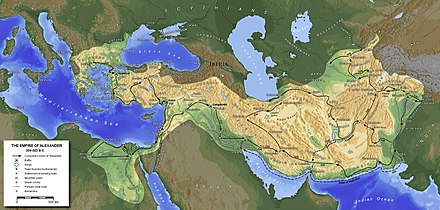
Back قائمة المدن التي أسسها الإسكندر الأكبر Arabic Liste der Alexander dem Großen zugeschriebenen Stadtgründungen German Aleksandrio (Helenismaj urboj) Esperanto Alejandría (desambiguación) Spanish Villes fondées par Alexandre le Grand French Daftar kota yang didirikan oleh Aleksander Agung ID Список городов, основанных Александром Македонским Russian Списак градова које је основао Александар Велики Serbian

| ||
|---|---|---|
|
Early rule
Conquest of the Persian Empire
Expedition into India
Death and legacy
Cultural impact
|
||
Alexander the Great (356 – 323 BC), a king of ancient Macedon, created one of the largest empires in history by waging an extensive military campaign throughout Asia. Alexander was groomed for rulership from an early age and acceded to the throne after the assassination of his father, Philip II. After subduing rebellious vassals, he invaded the Persian Achaemenid Empire in 334 BC. Alexander swiftly conquered large areas of Western Asia and Egypt before defeating the Persian king Darius III in battle at Issus and Gaugamela. Achieving complete domination over the former lands of the Achaemenids by 327 BC, Alexander attempted to conquer India but turned back after his weary troops mutinied. Following his death aged thirty-two in Babylon in 323 BC, his empire disintegrated in a series of civil wars fought between his followers.[1]
Alexander founded numerous settlements during his campaigns, naming them after himself or close followers. These have been the subject of intense debate, as the accounts of ancient and medieval scholars differ wildly and are often contradictory. Plutarch provides the maximum estimate of seventy cities in his Life of Alexander, but most texts attest to between ten and twenty foundations. The Greek Alexander Romance lists between nine and thirteen cities, depending on the recension; the Syriac, Armenian, Hebrew, and Ethiopic versions of the Romance also record twelve or thirteen foundations. Persian sources such as al-Tabari, al-Dinawari, Hamza al-Isfahani, and Qudama ascribe between nine and twelve settlements to Alexander. Stephanus of Byzantium recorded around twenty settlements. Some authors additionally document the number of cities established in a specific area: for example, Strabo records that Alexander founded eight cities in Bactria. The accounts of Alexander's campaigns, primarily those of Arrian, Plutarch, Diodorus, Curtius Rufus, and Justin, provide supplementary evidence. Finally, the geographers Eratosthenes, Ptolemy, and Pliny draw upon the otherwise-lost evidence of Alexander's bematist distance-measurers.[2]
When attempting to decipher the above sources, modern scholars face numerous problems. Classical writers tended to name every settlement a polis (πόλις, 'city'), from large population centres to small military garrisons; this leads to much confusion, especially considering the possibility that a settlement started out as a military colony and only later grew into a true polis.[3] Although it is often said that Alexander named all his foundations after himself, this is incorrect;[4] nonetheless, the abundance of these settlements led to many taking on epithets such as Eschate or Oxeiana. As some settlements may have taken on multiple such sobriquets, it is likely that "different authors, undoubtedly reflecting different local traditions, might have been referring to the same Alexandreia by different epithets", in the words of the historian Getzel Cohen.[5] In addition, the precise locations of many foundations are unknown. The classicist William Woodthorpe Tarn noted on the matter that "the difficulties of the subject are considerable, the margin of uncertainty often substantial, the sources of confusion numerous".[6]
- ^ Sources for Alexander's life and campaigns include Bosworth 1988, Lane Fox 2004, and Briant 2010.
- ^ Sources for Alexander's foundations include Tarn 1948, Fraser 1996, and Cohen 2013, pp. 35–37.
- ^ Tarn 1948, p. 233.
- ^ Hammond 1998, pp. 262–263.
- ^ Cohen 2013, pp. 38.
- ^ Tarn 1948, p. 232.
© MMXXIII Rich X Search. We shall prevail. All rights reserved. Rich X Search
